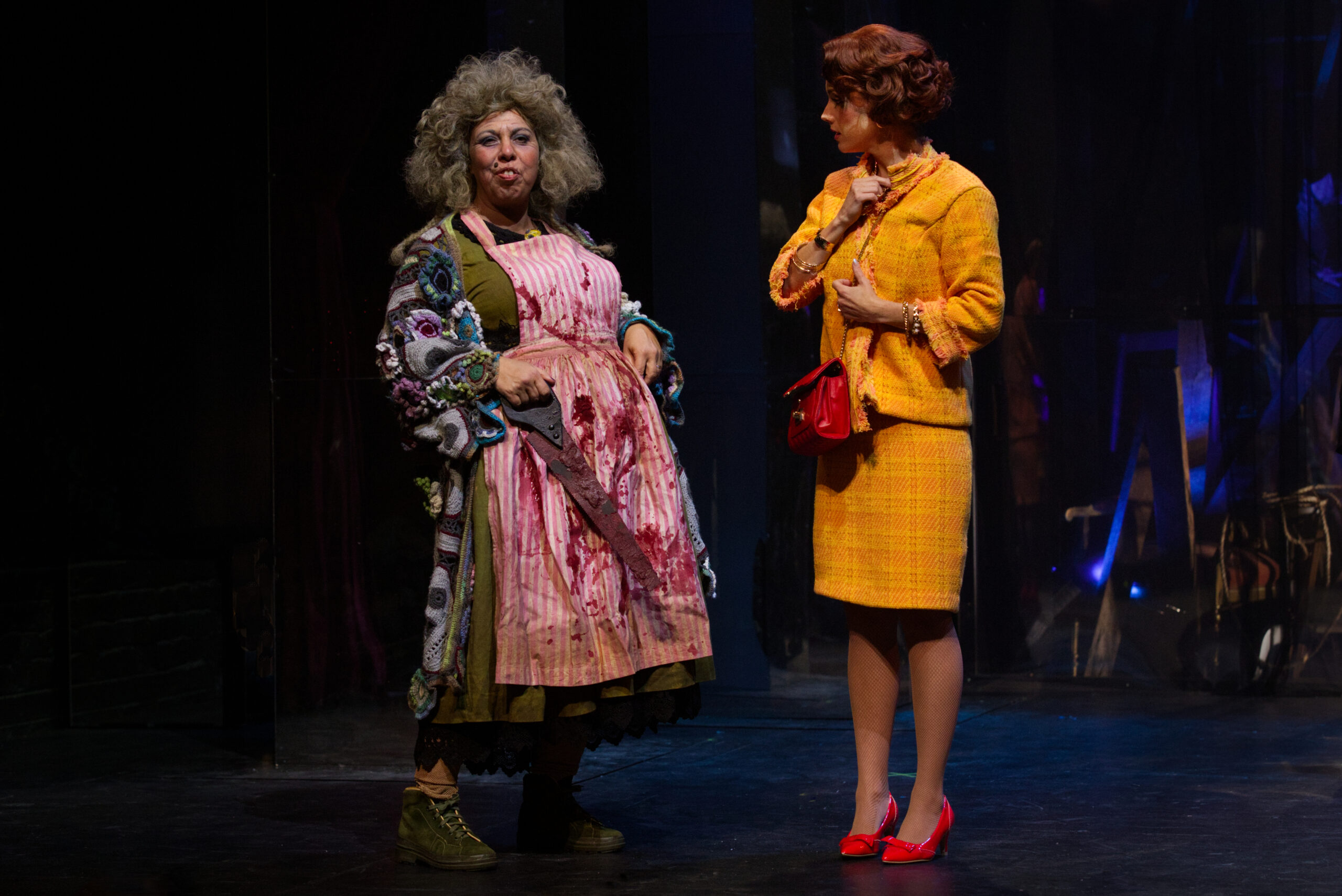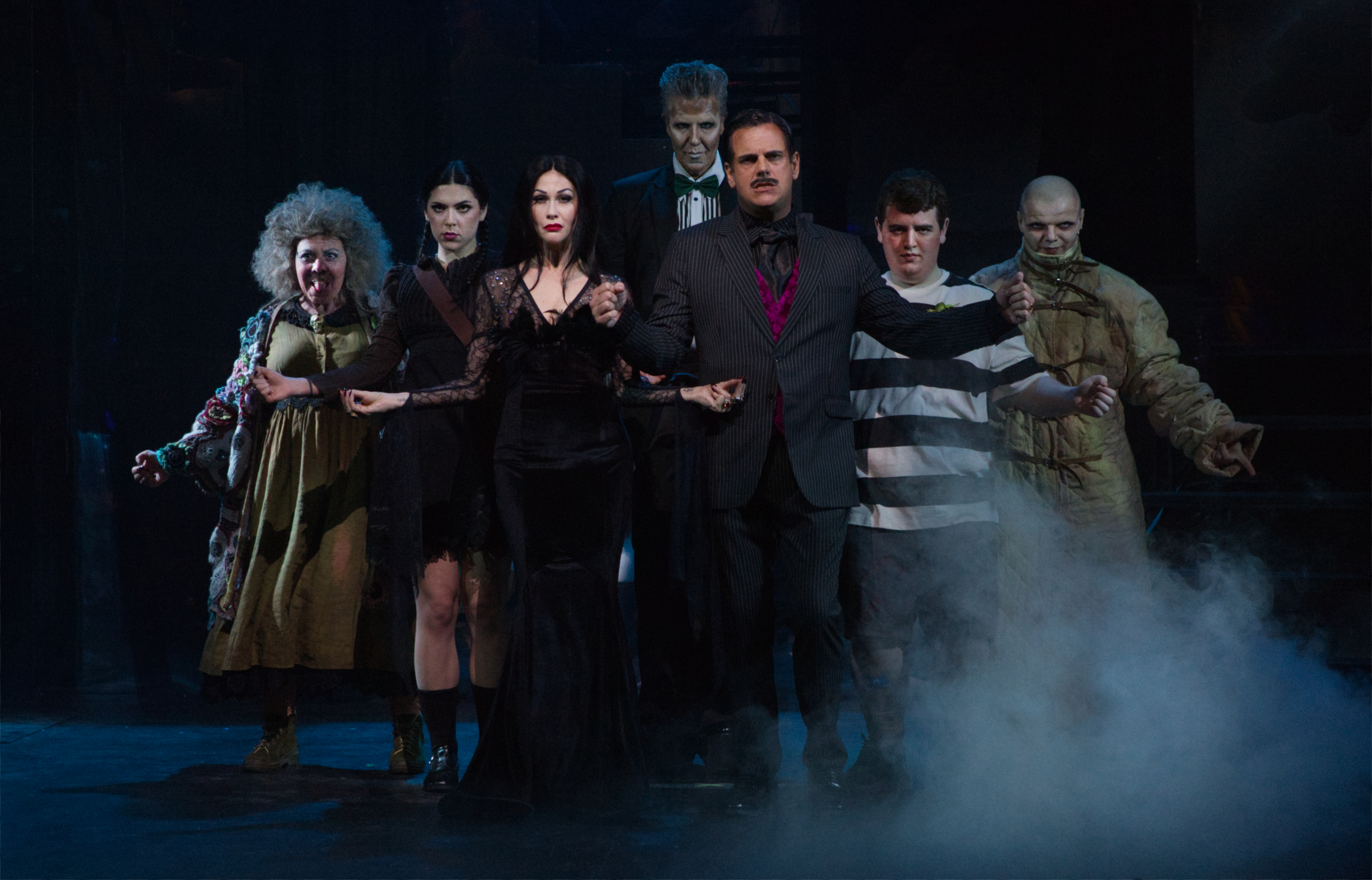What’s most surprising about The Addams Family, a musical that recently opened in Cape Town at The Homecoming Centre (formerly The Fugard Theatre), is also what’s most charming about the show: its wholesomeness.
Whether it is subversively wholesome, or wholesomely subversive, though, is up for debate. But what struck me most is just how incredibly sweet and clean-cut it is. It’s nothing short of old fashioned, in fact, feel-good to the point of being corny.
And maybe that’s a good thing. It is in many ways the perfect antidote to a world stuck in a politically bleak quagmire of doom-and-gloom despair.
The plot is at pains to stitch up every relationship, mend every character’s emotional problems, and effectively skirt around the proverbial s**t-show that is our day-to-day reality in order to present a story saturated with messages of hope, salvation, forgiveness and tolerance for all.
It is a musical in which fundamental moral lessons are dished out left right and centre: don’t keep secrets, never lie, stay true to yourself, honour your mother and father, never stop torturing your siblings, and once in a while you have to accidentally poison your dinner guests.
And, above all: accept, tolerate and respect everyone, no matter how different they may seem.
 Yahto Kraft as Fester Addams with a chorus of Addams ancestors in The Addams Family. (Photo: Jesse Kramer)
Yahto Kraft as Fester Addams with a chorus of Addams ancestors in The Addams Family. (Photo: Jesse Kramer)
 Wednesday and Fester Addams with a chorus of their ancestors. (Photo: Jesse Kramer)
Wednesday and Fester Addams with a chorus of their ancestors. (Photo: Jesse Kramer)
In many contexts, such overwhelming brightness might induce queasiness, come off as kitsch and cringe. Instead I found it rather touching, so much so that at some point, I simply caved, let myself fall for all the gooey, treacly sweetness of it, let it have its way with me.
The irony is overt, of course. The Addams Family is about a family of misfits and apparently criminally insane neo-Goths and shadow-dwellers who get their kicks from everything we’re meant to find repellent. They’re meant to represent a perversion of the moral order, poking fun at “normality”, disdainful about social niceties and the dreaded status quo.
They prefer night to day, darkness to light, anything awful is better than “nice”, and their predilections are for the macabre, the outrageous, the morbid and the bleak. They’re meant to send shivers down your spine, like an upside-down crucifix or a shadow that’s creepily replaced the original.
The Addamses enjoy misery and pain, they hang out in graveyards, commune with the dead, keep pet monsters and occasionally electrocute one another for kicks. And yet when Jordyn Shaefer’s Wednesday Addams sends bolts of electricity through her brother Pugsley as he dangles helplessly, upside down from the ceiling, he screams not because he’s suffering but out of sheer delight.
They’re well and truly messed up, the Addamses, and that’s their charm.
They regularly talk about death and dying with some sort of perverted relish. It is an upside-down, topsy-turvy moral universe they inhabit — and yet, when you get to the core of who they are, the only thing weird about them is how virtuous and squeaky-clean they really are.
They’re a kind of blueprint for black comedy, just waiting for the dark jokes to be conjured from the dark recesses of some twisted imagination.
Unfortunately, the biggest hurdle this show has to contend with is a script that never gets the tone of the intended morbidity quite right.
The story is clunky, meshed together from fragmented ideas, wan jokes and one-liners lifted from the earliest days of Charles Addams’s comic strips that were first published in 1938, almost three decades before his offbeat characters found their way into a TV series and were eventually adapted for the big screen.
With a book by Marshall Brickman and Rick Elice and songs by Andrew Lippa, the musical that premiered in Chicago in 2009 is not only a return to the spirit of the original New Yorker cartoons, but in many ways attempts to drag the audience back to the supposed innocence of earlier times.
 The dinner scene from The Addams Family. (Photo: Jesse Kramer)
The dinner scene from The Addams Family. (Photo: Jesse Kramer)
 Samantha Peo as Morticia Addams. (Photo: Jesse Kramer)
Samantha Peo as Morticia Addams. (Photo: Jesse Kramer)
 Chris van Rensburg as Mal Beineke and Tiaan Rautenbach as Gomez Addams in The Addams Family. (Photo: Jesse Kramer)
Chris van Rensburg as Mal Beineke and Tiaan Rautenbach as Gomez Addams in The Addams Family. (Photo: Jesse Kramer)
And that’s where its charm resides — in opting to try to convince a contemporary audience that a pair of 18-year-olds can fall in love and want to get married after a single kiss.
What ensues is a slightly flimsy, familiar story about what happens when the prudish parents of the boy that Wednesday has hooked up with come for dinner at the home of a family with a disdain for everything and everyone normal.
It’s a premise (a bit Romeo and Juliet meets Rocky Horror Show) that feels so familiar the outcome seems to write itself. Some might argue it did: the original Broadway production that starred (and squandered) the incredible talents of Nathan Lane and Bebe Neuwirth (as Gomez and Morticia respectively) was resoundingly panned by the press, first in Chicago where it premiered in November 2009, and then on Broadway where it opened early the following year.
Still, audiences lapped it up, and it ran for 722 shows in New York. And with some considerable rewriting and fixing of gaps, it’s become a revisionist triumph, especially popular as a high school show, and has circulated all around the world.
Fortunately, whatever gaps there are in the writing are more than made up for by the lavishness of the production. It is a very expensive-looking show: lush and velvety, full of realistic props, elaborate make-up and wigs, and some very cool costumes.
Even more impressive than the visual world that’s been designed, is the impeccable and hard-working cast. A screwball musical like this is a tough thing to pull off and yet this tight-knit cast throw every bit of themselves into creating a show that manages to seduce us into the alternative reality of the characters, make us believe that they exist, that their emotions are real and that the challenges they’re facing are worth singing about.
Tiaan Rautenbach is fabulous as Gomez, an over-thinker who is perpetually tormented by all the moral balancing acts he has happening in his head.
Samantha Peo’s Morticia Addams glides across the stage as though her feet are barely touching the ground, her deadpan performance edging towards open hostility whenever she’s faced with the stultifying blandness and banality of the world that exists beyond the parameters of her own perfectly messed-up family. When she dons an apron and enacts the demeanour of a standard-issue perfect housewife and announces that she’s put the apple pie on the window ledge to cool off, you implicitly understand the contempt that she and her family have for society. And you know that they have little tolerance for such nonsense as predetermined gender roles.
Blessed with a glorious voice, Bethany Dickson is enchanting as Alice Beineke, the poetry-spewing mother of the boy Wednesday is besotted with. She injects a rich dimensionality into a character evidently made brittle by years of conforming to expectation.
She starts out as one half of the clean-cut, awkwardly uptight conservative couple from Ohio (where, according to Gomez Addams, “vanilla was invented”), but by the time she climbs on the Addamses’ dinner table, you kind of expect her head to begin spinning as the demons of social anxiety and repression are inadvertently exorcised from her body.
Smaller roles that nonetheless manage to imprint themselves on the audience include the flatulent Grandma Addams (played as a kind of LSD-surviving savant by Candice van Litsenborgh), not-so-little Pugsley (a role shared during alternate performances by a pair of talented 16-year-olds, Londi Zuma and Connor Merryweather) and the Addamses’ borderline catatonic butler, Lurch (an under-utilised Brendan van Rhyn).
Even the chorus of singing-and-dancing ghouls, ghosts and apparitions peeking into this world from the other side are rendered memorable, well and truly brought to life by young actors giving it their all, fleshing out the story’s world and adding significant depth to the production.
A big surprise is Uncle Fester (played by Yahto Kraft), Gomez’s supposedly emotionally and mentally stunted brother whose straitjacket-riffing costume hints at some darker past than his cheery characterisation here would have us believe.
In this version, he is stripped of any and all darkness and malice, and instead comes off as sweetness incarnate, a kind of fairytale-spinning narrative gatekeeper who harbours some bizarre romantic proclivities of his own. He speaks in a high register, addresses the audience directly as though he alone has access to a realm the rest of the cast isn’t privy to, and ultimately engineers his own fairytale ending.
 Chad Baai as Lucas Beineke. (Photo: Jesse Kramer)
Chad Baai as Lucas Beineke. (Photo: Jesse Kramer)
 Brendan van Rhyn as Lurch with a chorus of Addams family ancestors. (Photo: Jesse Kramer)
Brendan van Rhyn as Lurch with a chorus of Addams family ancestors. (Photo: Jesse Kramer)
 Candice van Litsenbourgh as Grandma Addams, with Bethany Dickson as Alice Beineke. (Photo: Jesse Kramer)
Candice van Litsenbourgh as Grandma Addams, with Bethany Dickson as Alice Beineke. (Photo: Jesse Kramer)
There are in fact a number of fairytale romances at the heart of the show.
Not only is the hot romance between Morticia and Gomez constantly being put to the test, but the central plot revolves around Wednesday’s infatuation with bright-eyed Lucas Beineke (Chad Baai) who, despite a middle-class, all-American upbringing, has gone for the bad-ass, no-nonsense Goth girl, and must ultimately demonstrate that love is not only blind, but also potentially dangerous, especially when wielding a crossbow.
Despite the cloying nature of the script, this cast brings a fierce energy to the show, with enough freakishness and oddball goings-on to keep things interesting.
And that’s maybe the show’s ace-up-the-sleeve: it’s woke without being politically correct, old fashioned yet politely perverse.
Which is kind of the point of The Addams Family, that despite all the external and obvious weirdness we associate with the titular characters — their fondness for black, their penchant for degradation and decay, the way they get off on pain, suffering and fantasies of joining the afterlife — they’re ultimately fortified by a deep moral code, one that paints them as a kind of perfectly woke nuclear family in which everyone (living, dead or status unknown) has a place.
It’s almost impossible, so soon after the tragicomedy of the American election, to miss the fact that the collision course between the weirdo Addamses and the uptight Beinekes is a kind of symbolic encounter between political extremes.
And that it takes a lurid green potion stolen from Grandma’s drugs trolley to inadvertently set in motion the mayhem that leads to the show’s squeaky-clean resolution is perhaps the perfect metaphor for the state of the world today. DM
The Addams Family is playing at The Homecoming Centre in Cape Town’s East City Precinct until 2 February 2025.





